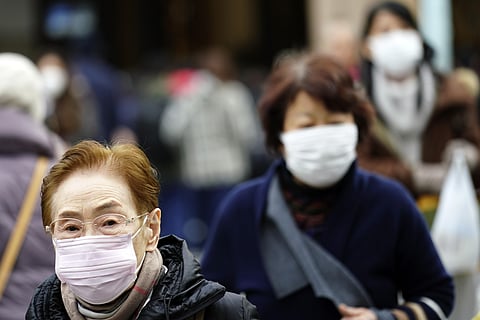

Chinese health authorities urged people in the city of Wuhan to avoid crowds and public gatherings, after warning that the coronavirus death toll has risen to at least nine and could spread further with more than 400 people infected.
The appeal came ahead of a World Health Organization meeting in Geneva later Wednesday to determine whether a global health crisis should be declared.
Here's everything you need to know about the outbreak.
What is a coronavirus?
Coronaviruses are known for causing SARS (Severe Acute Respiratory Syndrome), which can lead to pneumonia and other respiratory problems for the host. Another virus from the same family is now in the news due to the recent outbreak reported in the central Chinese city of Wuhan that has claimed nine lives as of 22 January.
How did the current outbreak happen?
We don't know yet. Coronaviruses are commonly found in animals including dogs and cats. The current Chinese outbreak is believed to have originated from the Huanan seafood market, where sea animals were reportedly sold alive. But, authorities are yet to pinpoint the infection's source, further increasing the panic. The market remains closed since the New Year.
Is the virus transferable?
Yes, it is. Human-to-human transmission via secretions of an affected individual has been confirmed by medical experts. A cough, sneeze or even handshake could cause exposure -- depending on how virulent the virus is -- reports state.
Has the outbreak been contained to China?
Unfortunately, no. It has been confirmed that the outbreak has spread not just to different Chinese provinces, but internationally. Coronavirus cases have been reported in Thailand, Japan and South Korea. The US confirmed that a person who returned from China has been infected while a man who recently travelled to Wuhan has been admitted to an isolation ward in Brisbane, Australia, after being suspected of having the virus.
Is the outbreak under control?
As of 21 January, the Chinese authorities had acknowledged 217 cases, double the number previously reported. However, the confirmed infection cases sharply rose to 440 just a day later. A total of 1,394 people are under medical observation while 765 have been discharged.
Chinese officials say the country is now at the "most critical stage" of prevention and control following confirmation that human-to-human transmission of the virus had taken place. Many countries have released travel advisories and strict screenings have been implemented at leading airports around the globe.
What are the symptoms?
There is evidence to confirm that the virus type discovered in China is mainly getting transmitted through the respiratory tract. According to the WHO, common symptoms of the novel coronavirus strain include respiratory troubles such as fever, cough, sore throat, shortness of breath and other difficulties.
How deadly is the virus?
The death rate of coronavirus infection is approximately 35% with people with a poor immune system more vulnerable.
Is anti-coronavirus vaccination available?
No. There is no known treatment for the coronavirus family till date although trials for a MERS vaccine are underway. The symptoms are expected to go away over time. The best prevention is to cover the mouth and nose, stay inside and avoid crowds.
Should we worry?
With the Chinese lunar new year around the corner, a large number of people from China are expected to travel to various destinations within the country and overseas (The Chinese government has estimated people will make around 3 billion trips during the Lunar New Year travel season). The more people mingle, the greater the risk of the outbreak spreading. Though not as deadly as Ebola, India is also on alert, especially at airports as a large number of people travel to and from China, Japan, Thailand and South Korea.